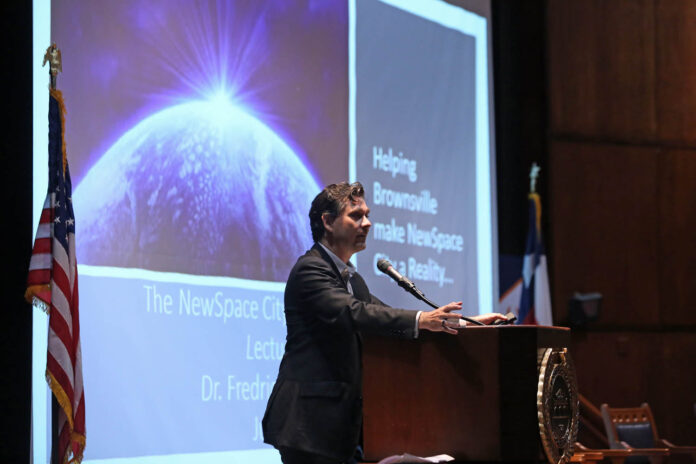BROWNSVILLE — The space industry is a global phenomenon that has accelerated rapidly just in the last two years, as more and more startup companies come into being focused on one or another aspect of the enormously difficult challenges of space exploration and development.
If Brownsville wants to grab a piece of that business, it better move fast, because success would mean a lot economically — not to mention the international prestige associated with being on the frontier of something entirely new.
That was a takeaway from “New Space City Brownsville,” the first installment of the city’s “Vibrant Lecture Series,” which happened Thursday evening on the Texas Southmost College campus and featured a six-member panel of internationally recognized experts in commercial space development, or “new space.”
The panel discussion followed Thursday morning’s ribbon-cutting ceremony for Expanding Frontiers, a new nonprofit corporation aimed at transforming Brownsville into a hub for new-space entrepreneurship. Referred to repeatedly during the events as “the trillion-dollar economy,” the private-sector space movement equals significant revenue for any city that manages to participate.
So says panelist Anita Gale, a retired Boeing engineer who worked on the Space Shuttle for 35 years and founded the Space Settlement Design Competition.
“We talked about a trillion-dollar economy,” she said. “Just getting some drippings from a trillion-dollar economy can be hundreds of millions of dollars. That’s pretty cool.”
However, it’s vital to have a workforce with the appropriate technical skills, Gale said.
“A lesson we learned from (Kennedy Space Center) is maintaining a workforce to support a lot of operations, having your young people learn the technical skills,” she said. “You don’t all need to be engineers. We don’t just need engineers for running a space program. … We don’t just need engineers in space when we start moving into space. You need wrench turners.”
The panel consensus seemed to be that Brownsville is uniquely positioned to take advantage of new-space opportunities, the technological innovations from which can be applied not only to space exploration but to earthbound industries such as energy, advanced manufacturing, communications, agribusiness and medicine.
It doesn’t hurt that SpaceX is building a space port at Boca Chica Beach, 24 miles east of the city. The Hawthorne, Calif.-based company broke ground on the site in 2014 and is preparing to conduct low-altitude hover tests on its Starhopper prototype at the site as early as Monday.
Panelist Sean Casey, cofounder and managing director of the Silicon Valley Space Center in California, called SpaceX an “amazing company” with a record of “amazing achievements.” While the world’s top-10 aerospace companies spend $8 billion a year on stockholder dividends, SpaceX pours its private investment dollars back into driving down the cost of launching rockets.
“SpaceX is disrupting the industry,” Casey said.
Not every city that wants to be a space hub will be a space hub, simply because there aren’t enough new-space companies to go around, even if they do measure in the hundreds, he said.
“One of the key advantages of Brownsville is you already have a major customer here,” Casey said. “That’s SpaceX.”
The trick is expanding beyond the single-customer model and bringing in other space companies, he said.
Panelist Steven Gonzalez, a technology transfer strategist at NASA’s Johnson Space Center in Houston, cited another reason Brownsville is well situated to capture a bigger piece of new space, remarking on the enthusiasm of local students and city leaders during a recent “Rockets & Rigs” conference.
“The enthusiasm and the support, the ingenuity that we found in the community was phenomenal,” he said. “We didn’t expect the ideas that came forward. There is a spirit here in Brownsville that is willing and ready to take advantage of this trillion-dollar economy. That’s what was exciting to see.”
Gonzalez said the city has the potential to create a niche as an international hub for new-space activity.
Sidney Nakahodo, cofounder of the New York Space Alliance, predicted that the international factor — Brownsville’s status as a gateway to Latin America — weighs in its favor.
“These are things we don’t see in other places that are considered more established space coasts,” he said.
Casey said the city has a number of geographical and physical advantages.
“You’re right on the border with Mexico, you have a port, you have an airport, you have planes and trains, and you have an excellent location for a space port,” he said. “And I think the most important thing — I have to agree with Steven on this — is the energy down here and the willingness to go for it.”
Still, turning “NewSpace City Brownsville” from a slogan into reality won’t come easily. It will require a serious and sustained commitment. Casey said it’s time for Brownsville to gauge the depth of its wish to be part of new space and then act accordingly.
“If you ask that question now your answer may actually matter,” he said. “If you ask it in the future it may not matter what your answer is. That ship may have done sailed. There may be so much other competition that you’re kind of crowded out of that space. I believe today is the time to be asking that question.”




